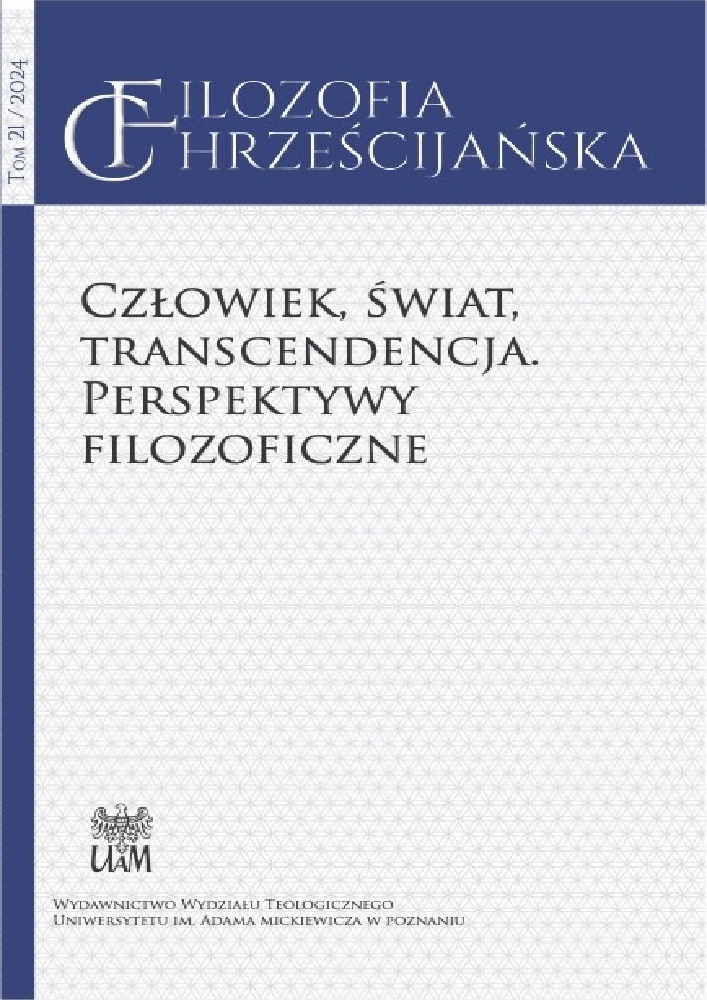Abstract
The aim of this article is to reconstruct and describe the cosmology of Hermogenes of Carthage, an early Christian theologian of Greek and Syrian origin. A secondary objective is to verify the available accounts on his teachings found in the works of Christian writers, especially Tertullian. The analysis of this issue starts by presenting the accounts and his biography. Subsequently, I present and analyse his concept of matter, followed by its relation to God and the act of creation. Finally, I focus on the interpretation of the biblical accounts on the world’s origin. I conduct the study using methods of literary studies, especially the hermeneutic and phenomenological methods. The main conclusion of this article is that Hermogenes, as a theologian, was a Christian Platonist and not a member or leader of a gnostic movement. Secondly, his ideas on matter and evil refl ect the contemporary views of many Mediterranean authors and philosophers. The research is based on Tertullian’s Adversus Hermogenem supplemented with Hippolytus’s Refutatio, as well as available texts of Platonic philosophers. This text sheds additional light on the issue of the adaptation of Platonic philosophy in early Christian theology.
References
Augustinus, De haeresibus, in: Sancti Aurelii Augustini Opera Pars XIII, 2., red. R. Vander Plaetse, C. R. Beukers, Corpus Christianorum Series Latina XLVI, Turnholti 1969, s. 283–358.
Filatrius Brixensis, Diversarum Hereseon Liber, red. F. Heylen, Corpus Christianorum Series Latina IX, Turnholti 1957, s. 207–324.
Hippolytus, Refutatio Omnium Haeresium, red. M. Marcovich, „Patristische Texte und Studien“, vol. 25., Berlin New York 1986. DOI: https://doi.org/10.1515/9783110858235
Hippolytus of Rome, Refutation of all Heresies, przeł. D. Litwa, Atlanta, GA 206.
Tertullian Q. S. F., Against Hermogenes, przeł. J. Waszink, New York 1965.
Tertullianus Q. S. F., Adversus Hermogenem, red. J. Waszink, Stromata Patristica et Mediaevalia, vol. 5., Utrecht-Antwerpen 1956.
Tertullianus, Q. S. F., De Anima, red. J. Waszink, Amsterdam 1947.
Theodretus Cyrensis, Haereticarum Fabularum Compendium, red. J.P. Migne, PG 83, Paris 1864.
Bennett B., Didymus the Blind’s Knowledge of Manichaeism, w: red. P. Mirecki, J. Beduhn, The Light and the Darkness: Studies in Manichaeism and its world, Leiden-Boston-Köln 2001, s. 38–67. DOI: https://doi.org/10.1163/9789004439900_004
Bigg C., The Christian Platonists of Alexandria, Oxford 1968. DOI: https://doi.org/10.1163/9789004646933
Bolgani F., Sullo scritto perduto di Teofi lo d’Antiochia „Contro Ermogene”, w: red. R. Cantalamessa, L. F. Pizzolata, Paradoxis Politeia. Studi Patristici in onore di Giuseppe Lazzati, Milano 1979, s. 77–118.
Bucur B., The Other Clement of Alexandria: Cosmic Hierarchy and Interiorized Apocalypticism, “Vigiliae Christianae” 60, 3 (2006), s. 251–268. DOI: https://doi.org/10.1163/157007206778149510
Chapot F., Tertullien : Contre Hermogène, Sources Chrétiennes 439, Paris 1999.
Davids A., Hermogenes on Matter. A note on the fi rst chapters of Tertullian’s Treatise against Hermogenes. [w:] red. G.J.M. Batelink, A. Hilhorst, C.H.J.M. Kneepkens, Eulogia: Mélanges offerts à Antoon R. Bastiaensen à l’occasion de son soixante-cinquième anniversaire. Turnholt 1991, s. 29–32 DOI: https://doi.org/10.1484/M.IPM-EB.4.000704
Danielou J., A History of Early Christian Doctrine Before the Council of Nicaea, vol. II, przeł. J.A. Baker, London & Philadelphia 1973.
Dodds E., Pogaństwo i chrześcijaństwo w epoce niepokoju, przeł. J. Partyka, Kraków 2014.
Dörrie H., Baltes M., Der Platonismus in der Antike. Grundlagen – System – Entwicklung, t. IV, Stuttgart 1993.
van Emden Boas E., Rijksbaron A., Huitink L., de Bakker M., The Cambridge Grammar of Classical Greek, Cambridge 2019. DOI: https://doi.org/10.1017/9781139027052
Filipowicz A., Tertulian przeciwko Hermogenesowi, czyli spór o stworzenie świata, Warszawa 2018.
Greschat K., Apelles und Hermogenes: Zwei theologische Lehrer des zweiten Jahrhunderts, Leiden 2000. DOI: https://doi.org/10.1163/9789004313149
Heintzel E., Hermogenes, der Hauptvertreter des philosophischen Dualismus in der alten Kirche, Berlin 1902.
Kitzler P., Ex uno homine tota haec animarum redundantia. Ursprung, Entstehung und Weitergabe der individuellen Seele nach Tertullian, w: „Vigiliae Christianae“ 64, 4 (2010), s. 353–381. DOI: https://doi.org/10.1163/004260310X12544604214272
Lilla S. R. C., Clement of Alexandria: A Study in Christian Platonism and Gnosticism. Oxford 1971.
Litwa D., The Evil Creator: Origins of and Early Christian Idea. Oxford 2021. DOI: https://doi.org/10.1093/oso/9780197566428.001.0001
Long A., Sedley D. Hellenistic Philosophy. T. II. Cambridge 1978.
May G., Creatio ex Nihilo: The Doctrine of ‘Creation out of Nothing’ in Early Christian Thought, przeł. A. S. Worrall, London-New York 1994.
Mohr R., Platonic Cosmology, Leiden Boston 1985. DOI: https://doi.org/10.1163/9789004320642
Moreschini C., Attico: una fi gura singolare del medioplatonism, w: Aufstieg und Niedergang der römischen Welt (ANRW), Principat, Berlin-New York 1978.
Waszink J. H., Observations on Tertullian’s Treatise against Hermogenes, w: Vigiliae Christianae Vol. 9, No. 2. (1955), s. 129–147. DOI: https://doi.org/10.2307/1582665
License
Copyright (c) 2024 Marc-Thilo Glowacki

This work is licensed under a Creative Commons Attribution-NoDerivatives 4.0 International License.
Autorzy
Autorzy tekstów przyjętych do publikacji w czasopiśmie Filozofia Chrześcijańska są zobowiązani do wypełnienia, podpisania i odesłania na adres redakcji umowy o udzielenie nieodpłatnej licencji do utworów, z zobowiązaniem do udzielania sublicencji CC.
Zgodnie z umową, autorzy tekstów opublikowanych w czasopiśmie Filozofia Chrześcijańska udzielają Uniwersytetowi im. Adama Mickiewicza w Poznaniu niewyłącznej i nieodpłatnej licencji oraz zezwalą na użycie sublicencji Creative Commons Attribution-NoDerivatives 4.0 International (CC BY-ND 4.0).
Autorzy zachowują prawa do dalszego, swobodnego rozporządzania utworem.
Użytkownicy
Zainteresowani użytkownicy internetu uprawnieni są do korzystania z utworów opublikowanych od 2015 roku w Filozofia Chrześcijańska pod następującymi warunkami:
- uznanie autorstwa - obowiązek podania wraz z rozpowszechnionym utworem, informacji, o autorstwie, tytule, źródle (odnośniki do oryginalnego utworu, DOI) oraz samej licencji;
- bez tworzenia utworów zależnych - utwór musi być zachowany w oryginalnej postaci, nie można bez zgody twórcy rozpowszechniać np. tłumaczeń, opracowań.
Do wszystkich tekstów opublikowanych przed 2015 r. prawa autorskie są zastrzeżone.
Inne
Uniwersytet im. Adama Mickiewicza w Poznaniu zachowuje prawo do czasopisma jako całości (układ, forma graficzna, tytuł, projekt okładki, logo itp.).

